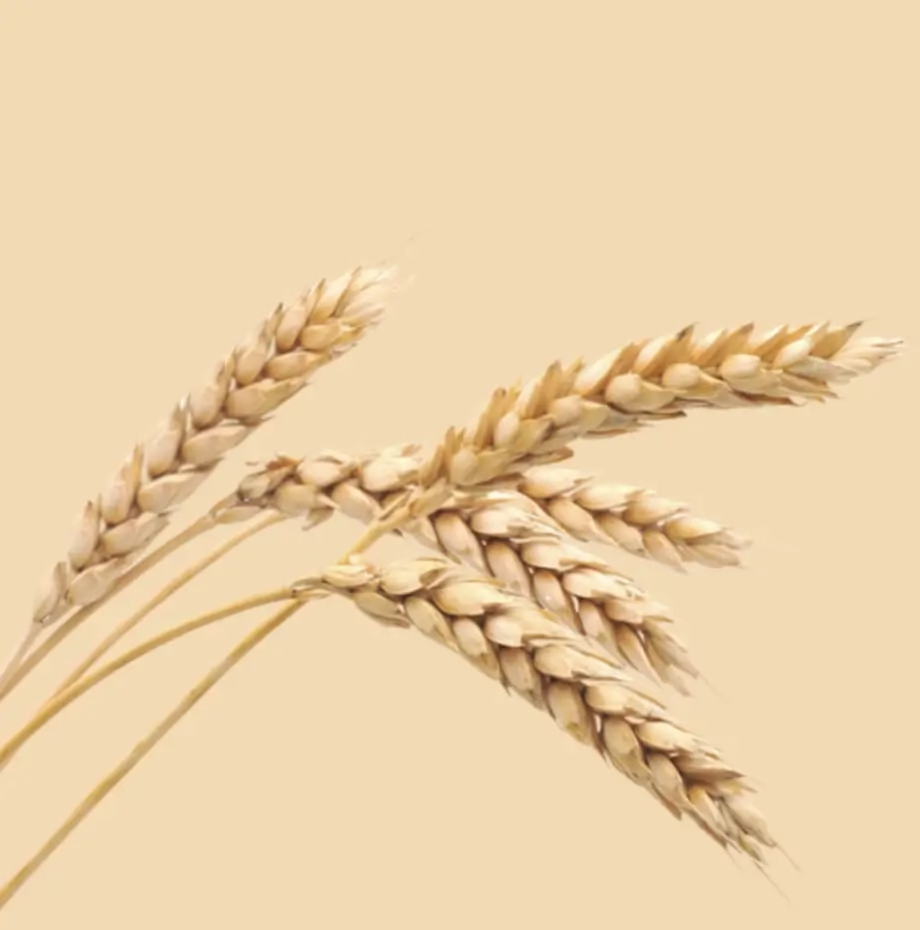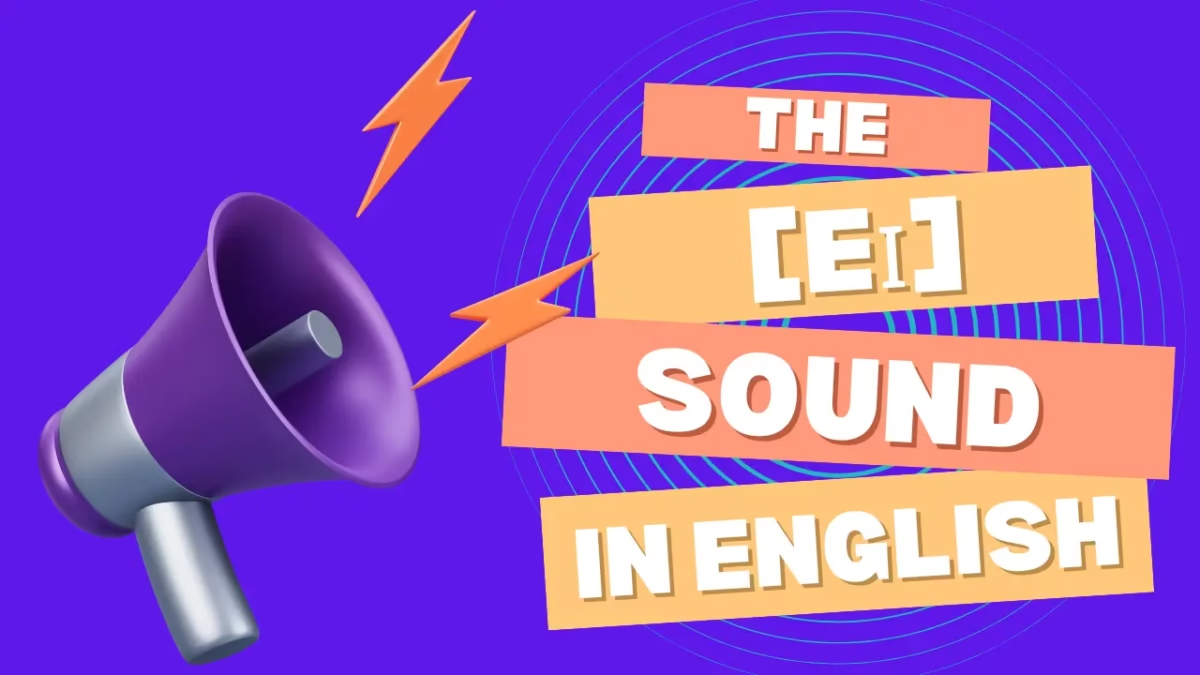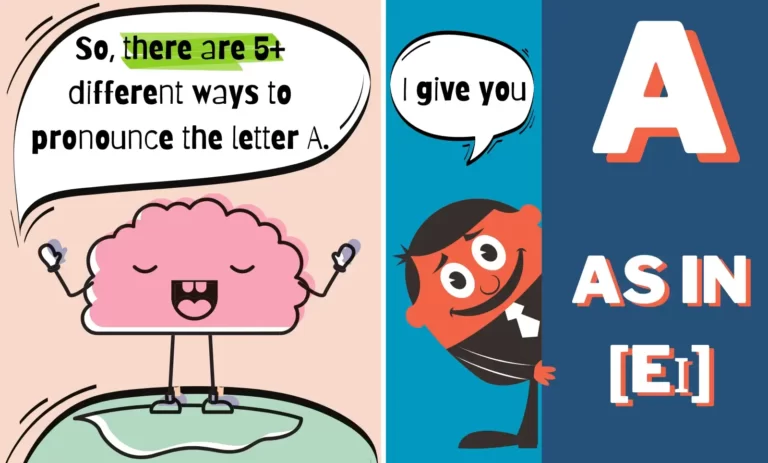The English language is notorious for its disconnect between spelling and pronunciation. That is one of its main challenges, especially for people whose native languages are the kind where “what-you-see-is-what-you-get” or say in our case. The sound [eɪ] is not an exception.
Luckily, some patterns can help (or not 😀) with making things a bit less complex.
Here, the focus is on the sound [eɪ] in English which is quite common and may involve several vowel combinations not just the letter A.
For example, the AI and AY combinations are usually (but not always ❗) pronounced as [eɪ].
The letter A as in [eɪ]
The letter A is pronounced as [eɪ] in open-syllable words.
age [eɪʤ], lady [ˈleɪdi], Kate [keɪt], tape [ teɪp ], snake [sneɪk], brave [breɪv]
Vowel and semivowel combinations:
The AI vowel combination
When A and I combine in AI, they usually make the sound [eɪ].
⬇️ Listen below
braid [breɪd], mail [meɪl], detail [ˈdiːteɪl], snail [sneɪl], maid [meɪd], sail [seɪl]
It’s worth mentioning that the AI combination can be found at the beginning, middle, and end of words, as the following examples show:
aid [eɪd], afraid [əˈfreɪd], maintain [meɪnˈteɪn], retain [rɪˈteɪn]
Note that the IA exists as well, but it makes other sounds. For example, social [ˈsoʊʃəl]; serial [ˈsɪˌriəl]; piano [piˈænoʊ], etc.
Some words, also known as homophones, are spelled differently and mean different things but still sound the same. Context is the only way to understand which word the speaker has in mind.

1. mail vs. male
This is Oreo. He is our 3-year-old male [meɪl] dog.
He likes to play with the mail [meɪl] when it arrives in the mail slot.
2. maid [meɪd] vs. made [meɪd]
I made a cake yesterday. ✅
I maid a cake yesterday. ❌

3. plane vs. plain
plane [pleɪn] n. – an aircraft
Do pilots see other planes when flying?
plain [pleɪn] adj. – simple or basic
It’s a plain but still very stylish dress.
4. sail [seɪl] vs. sale [seɪl]
Columbus set sail on August 3, 1492. ✅
Columbus set sale on August 3, 1492. ❌
Exceptions to the AI vowel combination
As with many rules, there are exceptions to this one as well. The most common example is when the AI combination is followed by the letter R. The -IR, as well as -ER, -UR, etc., follow a different set of rules.
When you see AI followed by R, you can expect a slightly different pronunciation.
It’s almost like you start to say the sound [eɪ] but stop midway and, instead of [ɪ], pronounce the shwa sound [ə] (or not) 🙄😃.
Here are some examples:
fair [fɛ(ə)r] ✅ not [feɪr] ❌
stairs [stɛ(ə)rz] ✅ not [steɪrz] ❌
pair [pɛ(ə)r] ✅ not [peɪr] ❌
hair [hɛ(ə)r] ✅ not [heɪr] ❌
dairy [ˈdɛ(ə)ri] ✅ not [deɪri] ❌
Many other words spelled with AI are pronounced differently, but that is not because of the letter R.
Here are some examples:
mountain [ˈmaʊntən], certain [ˈsɜrtən], curtain [ˈkɜrtən], captain [ˈkæptən], fountain [ˈfaʊntən], chieftain [ˈʧiftən], villain [ˈvɪlən], bonsai [bɑnˈsaɪ]
Another unexpected exception is the past and past participle forms of the verb to say. Even though they are spelled with the AI letter combination, the pronunciation doesn’t follow the rule above.
Let’s compare the verbs to say and to pay:
say [seɪ] – said [sɛd] – said [sɛd]
pay [peɪ] – paid [peɪd] – paid [peɪd]
Interactive practice
For some of the activities to work, you need to use the Chrome browser.

Drag & drop!
Say the words!


Listen & type!
Spell the words!

The AY vowel combination
When A is combined with (the semivowel) Y, they usually produce the sound [eɪ].
⬇️ Listen below
play [pleɪ], delay [dɪˈleɪ], stay [steɪ], dismay [dɪˈsmeɪ], clay [kleɪ], maybe [ˈmeɪbi]
The AY combination is usually found in the middle and at the end of the words or the end of the first word in a compound noun. It’s rare to see a word starting with AY.
Here are some examples:
play [pleɪ] – playground [ˈpleɪˌgraʊnd] (compound noun)
pay [peɪ] – payment [ˈpeɪmənt] (derivative word)
day [deɪ] – daydream [ˈdeɪˌdri:m] (compound noun)
Note that there is a YA combination, too. It makes other sounds, not the sound [eɪ]. For example, royal [ˈrɔɪəl]; yawn [jɔn], yard [jɑrd], etc.
Interactive practice
For some of the activities to work, you need to use the Chrome browser.

Drag and drop!
Say the words!


Listen & type!
Other vowel combinations
Sometimes, when E is combined with A, I, or Y, we produce the [eɪ] sound.
EA
steak [steɪk] , break [breɪk], great [greɪt]
but
ready [ˈrɛdi], head [hɛd], mean [mi(:)n], speak [spi(:)k]
EI
vein [veɪn], eight [eɪt], neighbor [ˈneɪbər], reign [reɪn]
but
heist [haɪst], height [haɪt]
EY
they [ðeɪ], obey [oʊˈbeɪ], prey [preɪ], hey [heɪ]
but
money [ˈmʌni], honey [ˈhʌni], key [ki:]
Where to go from here?
If you are interested in reading about pronunciation in general, go to the English Pronunciation: General Rules and Tips post. For a more on A as in [eɪ], read the “The Letter A as in [eɪ]” article.



